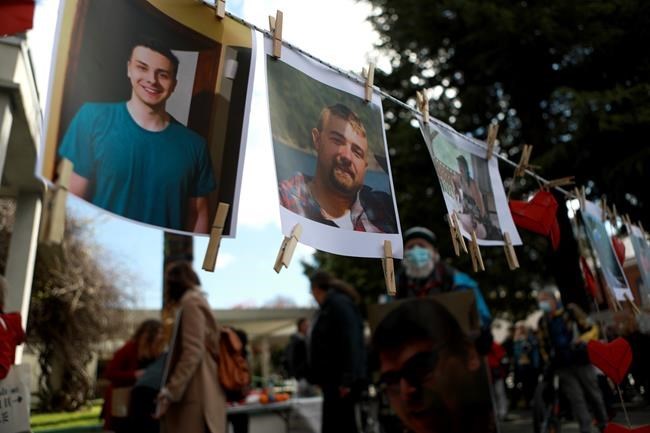VANCOUVER ŌĆö British Columbia's plan to decriminalize small amounts of illicit drugs for personal use starting Tuesday will include a dashboard of information that will be available to the public and updated quarterly, the federal mental health and addictions minister says.
Carolyn Bennett said the Canadian Institutes of Health Research will evaluate data on how decriminalization is working and the public is welcome to provide ideas on variables that could be measured as the policy proceeds during a three-year pilot project.
The federal government granted sa╣·╝╩┤½├Į an exemption last May from sa╣·╝╩┤½├Į's drug laws to allow substance users to possess a total of 2.5 grams of opioids such as heroin and fentanyl, as well as crack and powder cocaine, methamphetamine and MDMA, also known as ecstasy.
Over 11,000 people have fatally overdosed in the province from toxic street drugs since it was declared a public health emergency in 2016.
The new policy means people who carry drugs up to the permitted threshold for their own use will no longer be arrested or charged, and their illegal substances will no longer be seized.
"Through this exemption, we will be able to reduce the stigma, the fear and shame that keep people who use drugs silent about their use, or using alone, and help more people access life-saving supports and treatment," Bennett said at a news conference on Monday.
"All activities with illegal drugs, including production, trafficking, import and export, remain illegal, even if conducted with the drugs listed in the exemption in amounts under the 2.5 grams threshold," she added.
sa╣·╝╩┤½├Į's Mental Health and Addictions Minister Jennifer Whiteside said that instead of arresting people, police interacting with them will be handing out so-called resource cards with information on voluntary services available in their community.
Calls will be handled by "substance-use navigators" who have been hired by health authorities, she said.
"Those health authorities will be connecting people to all the resources that are available in that particular region, whether that is a detox bed, whether it's a counselling service, they'll have access to a whole range of supports," Whiteside said.
She said decriminalization is just one tool in the fight against the overdose crisis as the province works to ramp up services.
"Decriminalization is a crucial part of that system. It will help break barriers and create pathways for more people in our province on their pathway to wellness. We know there's more to do and we won't stop working until we turn the tide on this crisis."
The province has worked with the RCMP and municipal police to develop a range of training resources and guidance and so far, more than two-thirds of the officers have taken the training, Whiteside said.
Provincial health officer Dr. Bonnie Henry issued a report in 2019 urging the government to consider decriminalization so people who use drugs don't hide out of shame and are instead more open with health-care providers and willing to seek life-saving services and programs.
"It will not be perfect," said Henry of decriminalization, speaking at the news conference. "And it's not going to change the crises that we're dealing with overnight. But it is a philosophical and an important step that helps us take that next step together to make sure that we are doing everything we can and there are many different streams that people can follow."
Kathryn Botchford, whose husband, Jason Botchford, died of an overdose in the spring of 2019, said the well-known sports reporter was "a victim of sa╣·╝╩┤½├Į's overdose crisis."
Botchford said she had no idea the father of their three children, aged eight, six and three, was using an illegal substance and did not believe that could be true.
"His secret became my secret, which became this harbouring shame that I carried for a year. I was so fearful that people would judge him and tear down his legacy. I was fearful that people would judge me for not knowing. And even worse, I feared people would treat my children's loss of their father as insignificant because of how he died."
She now openly talks to her kids about substance use and hopes others will have the courage to start their own conversations, Botchford said.
Police had recommended a threshold of one gram of illicit drugs while the province applied for 4.5 grams.┬Ā
But drug users and advocates maintain those levels are too low and services may not be available, especially in rural and remote communities, when people are ready to use them. They also say decriminalization should have included youth under 18.
This report by The Canadian Press was first published Jan. 30, 2023.
Canadian Press health coverage receives support through a partnership with the Canadian Medical Association. CP is solely responsible for this content.
Camille Bains, The Canadian Press



